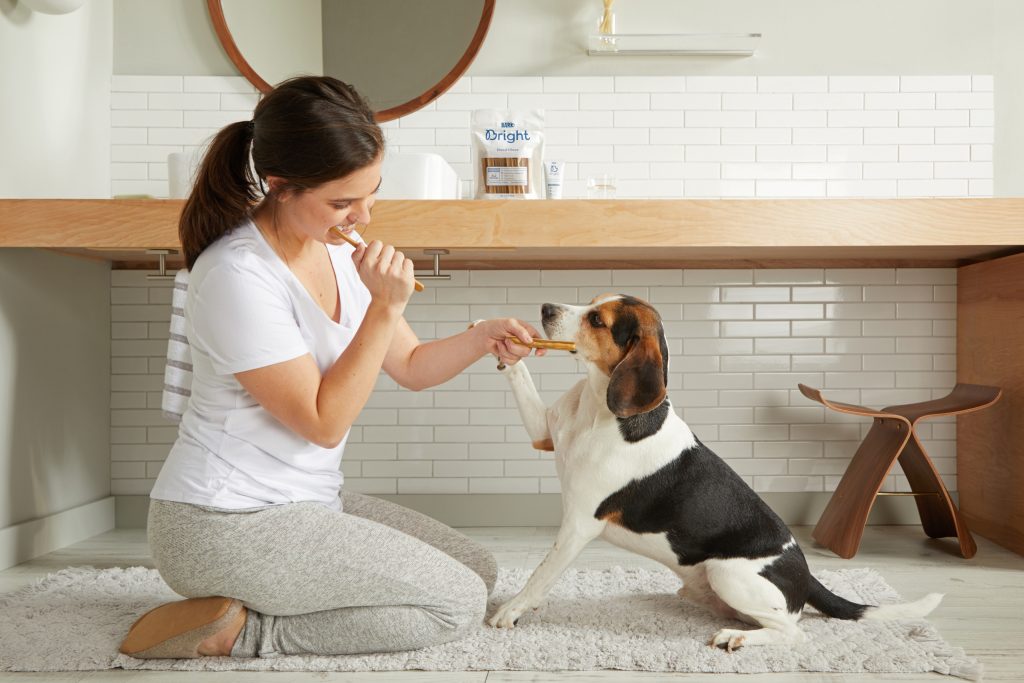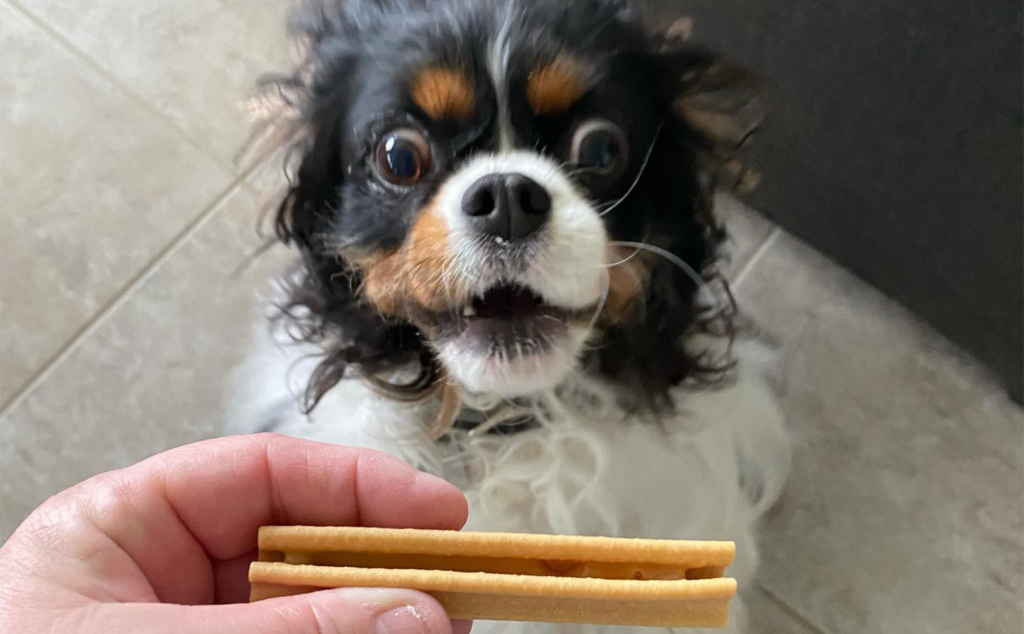For Pups With Short Attention Spans…
While dental chews, especially enhanced ones, can be very effective at preventing some instances of dog dental disease and bad breath, they are not as effective as brushing your dogs teeth. Dog dental chews are best used in conjunction with routine brushing to maintain your dogs dental health.
Attempting to brush your dog’s teeth can feel like suddenly throwing yourself into a pro wrestling ring—tasked with tackling dental disease and wrangling a squirmy pup, simultaneously. Repeated defeat during these matches lead many pet parents to seek out a stress-free solution, like dog dental chews, to keep their pup’s teeth clean. But are dental chews as good as teeth-brushing?


Sadly, no. While dental chews certainly have many benefits, and are better than doing nothing at all, there’s simply no substitute for regular toothbrushing. Dental chews are best used in conjunction with brushing. (Think of brushing as Batman, and dental chews as Robin!)
And neglecting to brush is a big deal: over 80% of dogs older than 3 years old have been found to have periodontal disease1, which is especially notorious for wreaking havoc in small breed dogs and in older dogs of all sizes2. In advanced stages, dental disease can lead to issues such as:
- Severe pain (especially when chewing)
- Loss of appetite (often due to pain)
- Soft-tissue damage (destroys gums that hold teeth in place)
- Funky, stank dog-breath
- Tooth loss (your dog is kinda gonna need those)
- Bleeding gums (their favorite toy will soon look like a crime scene after chewing)
- Deterioration of the jawbone (bacteria sneaks into tissue and bone. jaw can break!)
- Infection that can spread through blood to other areas of body
- Heart, lung, kidney disease
Related Article: 5 Ways Dental Disease Affects Your Dog’s Health


You might be thinking, “OMG, 80% of dogs are suffering through this? That’s so many!” but there’s no mystery behind it. Our furry friends haven’t yet developed opposable thumbs to be able to brush their own teeth, so they rely on us to keep them healthy. However, many pet parents are unaware of the brutal consequences that come from neglecting their pup’s teeth. And others may understand the importance of toothbrushing, but it takes a Hurculean effort to get their dog to cooperate.
Related Article: How To Brush Your Dog’s Teeth
Effectiveness Of Toothbrushes
Research studies have concluded time and time again that toothbrushing is the gold standard in doggie dental care3,4—no product currently on the market (e.g. dental chews, dental diets, mouth rinses) is as effective at fighting periodontal disease as a good ol’-fashioned toothbrushin’. Brushing your dog’s teeth ensures each tooth is being brushed. The tiny bristles have access to most nooks and crannies for a thorough clean. And toothpaste helps to brush away debris or even break down plaque and bacteria.
Effectiveness Of Dog Dental Chews
Although brushing your dog’s teeth has shown to be the overall most effective method to prevent dental disease, studies have also proven that dental chews are still an extremely effective method to improve your dog’s dental health and prevent disease. Daily dental chews have been proven to successfully reduce plaque, tartar and calculus buildup over time5,6, decrease incidents of gum bleeding5,6, improve stinky breath6,7, and overall help prevent future periodontal disease6,8. Dental chews are particularly effective when used in combination with regular toothbrushing, or as a gentle introduction to dental care for toothbrush-stubborn pups. That’s a win for dog parents everywhere!
How Do Dog Dental Chews Work?


What your dog sees as a little chewy stick bestowed upon them by the snack gods, is actually a chewy dental treat that gently scrapes and scrubs your pup’s teeth clean as they chew. When given daily, these dental treats help to prevent the buildup of plaque and tartar that lead to tooth decay and periodontal disease in dogs. Some dental chews also have additional functional ingredients to help fight bacteria, gingivitis, and plaque/calculus.
Oh, and did we mention that just one dental chew each day helps take your pup’s breath from funky fish-filled dumpster fire to a field of fresh flowers; from “eww-dat’s-toilet” to “eau de toilette” (that’s French for “your pup’s stank breath is gone”) in one simple step!
Traditional Dental Chews
While some traditional dental chews incorporate functional ingredients (like enzymes, chelators, antimicrobials, and antioxidants), the majority of dental chews on the market rely on scrubbing action alone. Their unique texture is firm enough to gently scrub teeth clean as dogs chew, long-lasting enough that they won’t be devoured in one bite, and soft enough that you don’t need to worry about your dog breaking or chipping a tooth. This texture also allows your dog to sink their teeth into them all the way down to their gum line, to improve gum health, as well as overall dental health.
New And Improved Dental Chew Kits
A newer type of dental chew has found a way to take dental care to the next level. Dental chew kits, like BARK BrightBark Bright Dental, take all the scrubbing action of a traditional dental chew and combine it with the cleaning power of an enzymatic toothpaste. The idea is that enzymes in the toothpaste actually help break down the leftover food, bacteria, and plaque stuck in the deep dark abyss of your dog’s mouth to make it easier for the dental chew to whisk away all the gunk. There’s no additional work on your part other than squeezing a line of the enzymatic toothpaste into a groove on the side of the chew. And voila! It’s a true game-changer in the world of dog dental chews.
Related Article: BARK Bright: How It Works, Dog Dental Care Basics, & Important Terms To Know
Looking for a proactive approach to your dog’s dental health? BARK Bright pairs an enzymatic toothpaste with specially-shaped dental chews so your dog’s pearly whites stay in tip-top shape!


Benefits Of Dog Dental Chews
First, a disclaimer: the existing studies on the effectiveness of dental chews don’t apply to every dental chew. They’re studying one specific chew’s effect on periodontal disease markers. While there are general patterns, no study applies to every dental chew on the market. Always do your research on a particular brand before assuming it works as well as it claims!


1. Stress-Free Supplement to Toothbrushing
Brushing your dog’s teeth can be stressful for both dog and dog parent. In your dog’s eyes, they have no idea why you’re coming at them with this weird bristly stick, and in your eyes you’re like, “WHY WON’T YOU SIT STILL?!” Luckily, dental chews are the part of the dental routine that sail down easy street, and can be a great way to either prepare for, or wind down from, the stresses of a toothbrushin’.
2. Budget-Friendly
Luckily, dental chews are affordable on most budgets and can cost as little as a $1/day. With subscriptions like BARK Bright,Bark Bright Dental Chews you can even have them shipped to your door monthly. Now, you never have to worry about getting yelled at by your pup for running out of chews!
3. Reduce Plaque And Tartar Buildup
As we mentioned above, numerous studies have proven that, when combined with regular toothbrushing, doggie dental chews can significantly reduce plaque, tartar, and calculus buildup5,6. Say buh-bye to all that gunk making itself at home on your pup’s toofers!
4. Improve Gum Health And Prevent Gingivitis
If you’ve ever noticed some pink spots on your dog’s toys or bones after they’re done playing with them, these specks of blood can be a sign that your dog’s gum health isn’t up to par. They may be developing gingivitis. Luckily, doggie dental chews have been shown to reduce incidents of bleeding gums and help prevent gingivitis5,6.
5. Help Prevent Future Dental Disease
Some dental chews have been shown to significantly reduce the chances of your pup developing periodontal disease6,8. Dental disease is one of the leading health concerns in dogs of all ages. In advanced stages it can lead to soft-tissue damage, tooth and bone loss, and eventually cause serious health issues, like heart and kidney disease. A little bit of toothbrushin’ and dental-chewin’ seems like an easy price to pay to avoid all these preventable health issues!
6. Improve Bad Breath
Research studies comparing the levels of stinky breath between dogs given daily dental chews vs. dogs given no dental chews, and have found that chews can be successful at improving funky dog breath according to their funk-o-meter scale7.
Dog Dental Chew Q&A:


What’s The Best Doggie Dental Chew?
The best doggy dental chew is gonna be one that is soft enough that you can dent your nail into it (anything harder can cause broken or chipped teeth), but hard enough to last a long time. Your best bet is to choose a chew that has the right flavor, size, and texture for your pup, is VOHC accepted, and has a track record of success for your dental goals. And be sure to check out a kit like Bark Bright Dental, that includes an enzymatic toothpaste along with the chew!
Related Article: Popular Dog Dental Chews: BARK Bright vs. Greenies vs. Dentastix vs. Whimzees
Are Dental Chews Okay For Dogs With Bad Teeth?
Calculus buildup and infected teeth and gums always need to be addressed by a veterinarian first, because they can be signs of advanced disease that requires medical intervention. These issues often require an anesthetized dental exam and treatment (such as deep cleaning, extraction, or sealants). Depending on what shape your pup’s teeth are in, it may also be difficult or painful for them to chew the treat before tending to the underlying problem.
Chews do their best work in preventing dental disease from gaining a big foothold in your dog’s mouth – they are not the best choice for dogs with established disease, and can actually be painful or harmful. Check with your vet!
Can Puppies And Small Dogs Eat Dental Chews?
You should always wait until your puppy’s adult teeth come in before offering them a dental chew—their puppy teeth may not be strong enough yet to handle a dental chew without causing damage. However, for adult small breed dogs prone to dental issues (like Chihuahuas), doggie dental chews can be a game changer! According to a 2021 study, a majority of dogs diagnosed with periodontal disease weigh under 33 lbs, with the worst cases being among small breed dogs under 14 lbs2. That’s even more reason to take this one simple step each day and give your pup a treat that will improve their health.
How Often Should You Give Your Dog Dental Chews?
For best results you should give your dog a dental chew once daily. Make sure to account for those calories when budgeting out their treats for the day!
Do Dog Dental Chews Come In Different Flavors?
You bet they do! Although the majority of dog dental chews lean toward chicken flavor, you can also find them in all kinds of yummy flavors—including beef, mint, blueberry, and even pumpkin spice!
Do Dog Dental Chews Come In Different Sizes?
Most brands offer at least three different sizes of chews—small, medium, large—according to your dog’s needs. However, some brands also offer sizes for puppies, extra small dog breeds and giant dog breeds.
This article has been reviewed by Margo Hennet, DVM.
Margo Hennet, DVM, cVMA, and veterinarian at BARK is a canine nutrition, health, & wellness connoisseur. She has a combined 10 years of experience in clinical medicine, research, and education—that’s 70 dog years of know-how—and graduated from Colorado State University as a Doctor of Veterinary Medicine. She completed specialized training in internal medicine prior to working as a general practitioner in Colorado, has authored peer-reviewed publications and textbook chapters, holds certification in veterinary medical acupuncture, and is a member of the American Academy of Veterinary Nutrition and American Veterinary Medical Association.
Sources:
1 Enlund, Karolina Brunius, et al. “Dog Owners’ Perspectives on Canine Dental Health-A Questionnaire Study in Sweden.” Frontiers, Frontiers In Veterinary Science, 9 June 2020, https://www.frontiersin.org/articles/10.3389/fvets.2020.00298/full.
2 Wallis, C., et al. “Association of Periodontal Disease with Breed Size, Breed, Weight, and Age in Pure-Bred Client-Owned Dogs in the United States.” The Veterinary Journal, W.B. Saunders, 19 July 2021, https://www.sciencedirect.com/science/article/pii/S109002332100112X.
3 Allan, R. M.; et al. “Prospective Randomised Blinded Clinical Trial Assessing Effectiveness of Three Dental Plaque Control Methods in Dogs.” Wiley Online Library, Journal Of Small Animal Practice, 21 Dec. 2018, https://onlinelibrary.wiley.com/doi/abs/10.1111/jsap.12964.
4 “Periodontal Disease: Oral Health.” Veterinary Oral Health Council (VOHC), http://www.vohc.org/veterinary_oral_health.html.
5 Gawor, Jerzy. et al. “Comparison of a Vegetable-Based Dental Chew to 2 Other Chews for Oral Health Prevention.” Sage Journals, Journal of Veterinary Dentistry, 16 Nov. 2021, https://journals.sagepub.com/doi/full/10.1177/08987564211054225.
6 Quest, Bradley W. “Oral Health Benefits of a Daily Dental Chew in Dogs.” Sage Journals, Journal of Veterinary Dentistry, 1 June 2013, https://journals.sagepub.com/doi/abs/10.1177/089875641303000203.
7 Carroll, Meredith Q.; et al. Effects of Novel Dental Chews on Oral Health Outcomes and Halitosis in Adult Dogs, Journal of Animal Science, Volume 98, Issue 9, September 2020, skaa274, https://doi.org/10.1093/jas/skaa274
8 Brown, Wendy Y.; et al. “Effective Periodontal Disease Control Using Dental Hygiene Chews.” Sage Journals, Journal of Veterinary Dentistry, 1 Mar. 2005, https://journals.sagepub.com/doi/abs/10.1177/089875640502200102.







